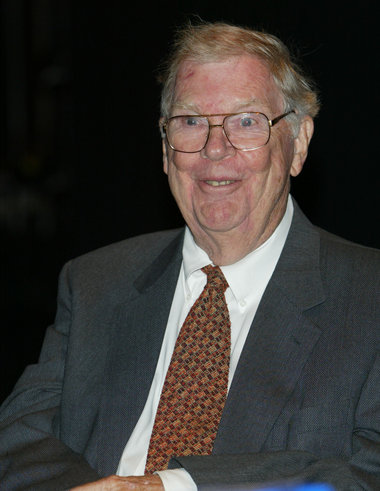Tom Wicker (Thomas Grey Wicker)

Wicker was born in Hamlet, North Carolina. He was a graduate of the University of North Carolina. He won a Nieman Fellowship at Harvard University in 1957. In 1993, he returned to Harvard, where he was a fellow at the Kennedy School of Government. He died from an apparent heart attack, on November 25, 2011. Wicker began working in professional journalism in 1949, as editor of the small-town Sandhill Citizen in Aberdeen, North Carolina. By the early 1960s, he had joined The New York Times. At the Times, he became well known as a political reporter. He was one of the lead journalists for the paper’s coverage of the assassination of President Kennedy, and he had ridden in a press bus in that Dallas motorcade. Wicker was a shrewd observer of the Washington, D.C. scene. In that capacity, his influential “In The Nation” column ran in the Times from 1966 through 1992. In an exit-interview Q & A with fellow Times reporter R.W. Apple, he reflected on one primary lesson of his years in the capital. Apple asked whether Wicker had “any heroes” in political life. Wicker began working in professional journalism in 1949, as editor of the small-town Sandhill Citizen in Aberdeen, North Carolina. By the early 1960s, he had joined The New York Times. At the Times, he became well known as a political reporter. He was one of the lead journalists for the paper’s coverage of the assassination of President Kennedy, and he had ridden in a press bus in that Dallas motorcade. Wicker was a shrewd observer of the Washington, D.C. scene. In that capacity, his influential “In The Nation” column ran in the Times from 1966 through 1992. In an exit-interview Q & A with fellow Times reporter R.W. Apple, he reflected on one primary lesson of his years in the capital. Apple asked whether Wicker had “any heroes” in political life.
Wicker’s work earned him a place on the master list of Nixon political opponents. He wrote the essay on Richard Nixon for the book Character Above All: Ten Presidents from FDR to George Bush (1995). Wicker was mentioned in a 60 Minutes report from the 1970s which detailed how, along with other journalists and members of Congress who supported desegregation busing, Wicker and the others nevertheless sent their children to DC private schools. In a secret operation code-named “Operation Minaret,” the National Security Agency (NSA) monitored the communications of leading Americans, including Wicker and other prominent U.S. journalists, Senators Frank Church and Howard Baker, civil rights leaders, including Dr. Martin Luther King, and prominent U.S. athletes who criticized the U.S. war in Vietnam. A review by NSA of the NSA’s Minaret program concluded that Minaret was “disreputable if not outright illegal.”
Born
- June, 18, 1927
- USA
- Hamlet, North Carolina
Died
- November, 25, 2011
- USA
- Rochester, Vermont


